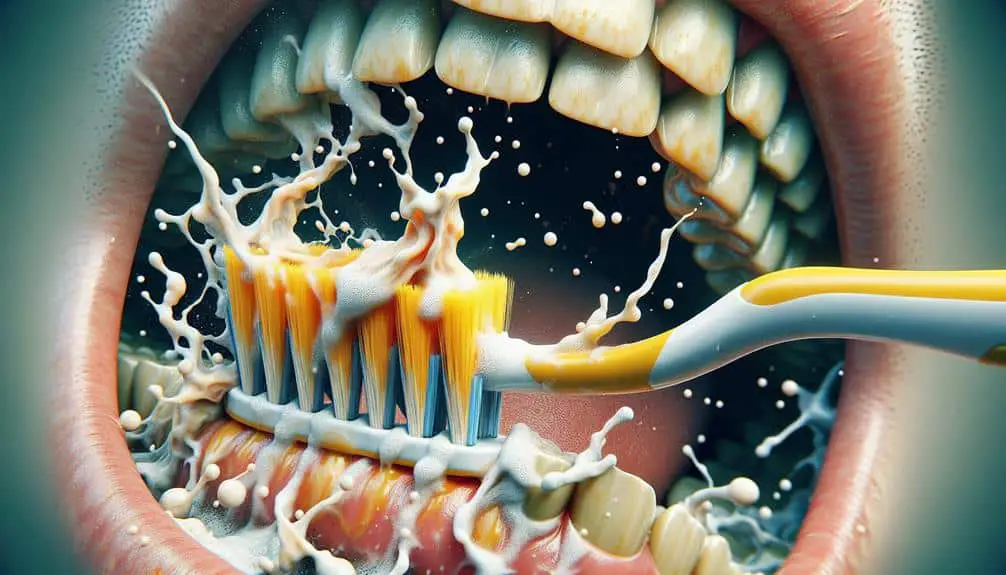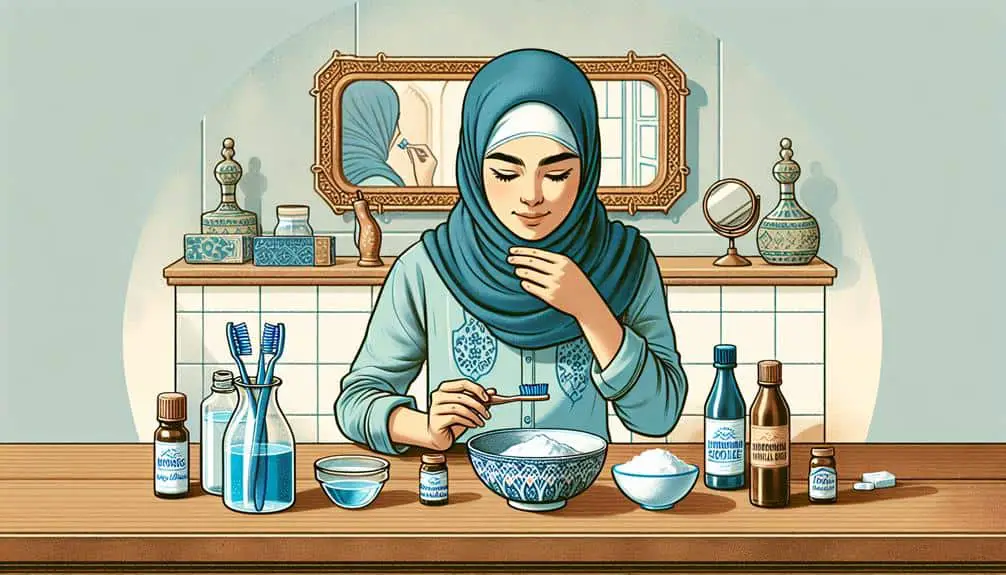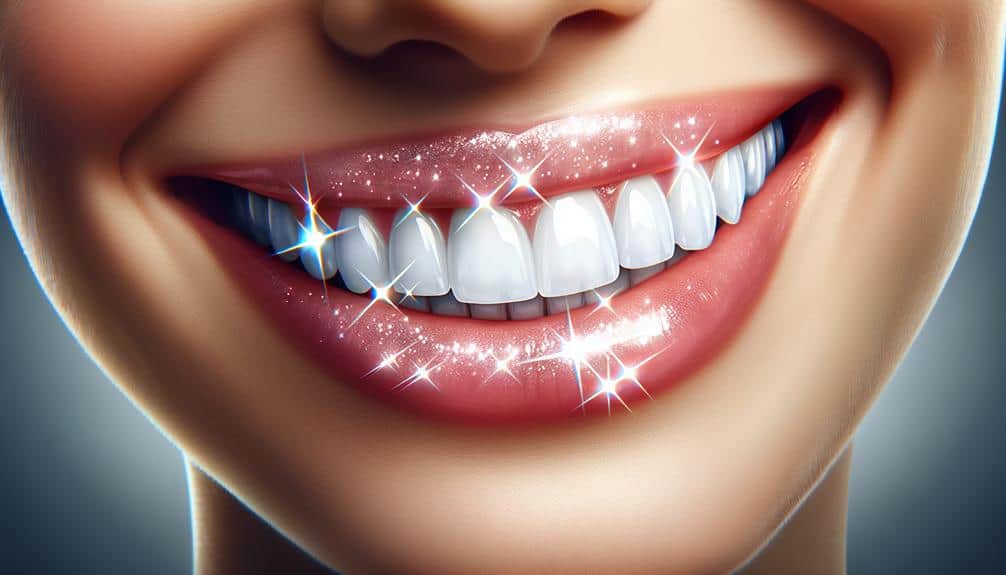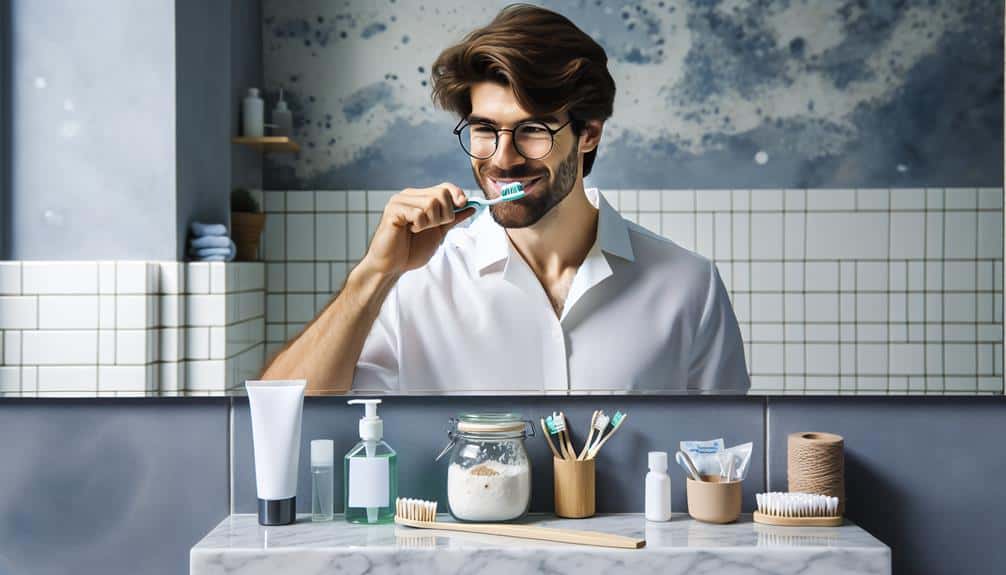If you're dealing with stubborn teeth discoloration, consider the causes like consuming dark-colored foods or smoking. Prevent further discoloration by maintaining good oral hygiene, reducing staining foods, and using a straw. Choose a teeth bleaching kit with the right concentration and form after consulting with a dentist. Use toothpaste with abrasive ingredients or natural remedies like baking soda.
Maintain your whitened teeth with consistent oral care and regular dental visits. For more professional tips on stubborn teeth discoloration whitening, explore effective stain removal techniques and consult with a dental professional to assess and recommend suitable treatments for your specific case.
Key Points
- Consider professional teeth whitening for stubborn discoloration.
- Address underlying dental issues like enamel erosion.
- Opt for personalized treatment plans from a dental professional.
- Follow up with recommended oral hygiene practices.
- Maintain results with regular dental check-ups and lifestyle adjustments.
Understanding Tough Teeth Discoloration
When dealing with tough teeth discoloration, understanding the underlying causes is essential for effective treatment. Teeth discoloration can be caused by various factors, such as consuming dark-colored foods and drinks like coffee, tea, or red wine, smoking, poor oral hygiene leading to plaque buildup, certain medications like tetracycline, and aging.
Prevention plays an important role in avoiding teeth discoloration. Maintaining good oral hygiene by brushing your teeth at least twice a day, flossing daily, and visiting your dentist regularly can help prevent discoloration caused by plaque buildup. Additionally, reducing the consumption of staining foods and drinks or using a straw to minimize contact with teeth can also aid in prevention.
It's important to address the causes of teeth discoloration to effectively prevent and treat it. By understanding these causes and implementing preventive measures, you can maintain a brighter and healthier smile.
Choosing the Right Teeth Bleaching Kit
Looking to whiten your teeth effectively at home? Choosing the right teeth bleaching kit is essential for achieving the desired results. When selecting a teeth whitening kit, consider factors such as the concentration of the bleaching agent, the form of the product (gel, strips, trays), and potential sensitivity issues.
Home remedies like baking soda or charcoal may be tempting due to their natural appeal, but they aren't as effective as professional bleaching kits recommended by cosmetic dentistry professionals. These over-the-counter kits contain carbamide peroxide or hydrogen peroxide in concentrations that are safe for home use while still providing effective whitening results.
Before purchasing a teeth bleaching kit, consult with your dentist to make sure it's suitable for your dental health. Some kits may not be recommended for individuals with certain dental conditions. By choosing the right teeth bleaching kit and following the instructions carefully, you can effectively whiten your teeth at home and achieve a brighter smile.
Tips for Effective Stain Removal
For effective stain removal, utilizing a toothpaste with abrasive properties can help eliminate surface discoloration and improve the overall appearance of your teeth. Look for toothpaste containing ingredients like silica, calcium carbonate, or alumina, which can gently scrub away stains without causing damage to the enamel. When brushing, make sure you use gentle pressure to avoid wearing down the enamel over time. Additionally, natural remedies such as baking soda and hydrogen peroxide can be effective in removing stains. Baking soda, when used sparingly, can act as a mild abrasive to help scrub away surface stains. Hydrogen peroxide, when diluted with water, can also help lighten stains.
Incorporating lifestyle changes can further aid in stain removal. Limiting consumption of staining substances like coffee, tea, and red wine can prevent new stains from forming. Drinking water after consuming these beverages can help wash away pigments before they settle on the teeth. Maintaining good oral hygiene practices, such as regular brushing and flossing, is essential in preventing and reducing teeth discoloration.
Maintaining Whitened Teeth
Wondering how to effectively maintain your whitened teeth for long-lasting brightness and shine? Here are some key strategies to help you preserve your bright smile:
- Consistent Oral Hygiene: Brush your teeth at least twice a day and floss daily to prevent stains caused by plaque buildup.
- Use Whitening Toothpaste: Incorporate a whitening toothpaste into your oral care routine to help maintain the brightness of your teeth.
- Watch Your Dietary Habits: Limit consumption of staining foods and beverages like coffee, tea, red wine, and berries to prevent discoloration.
- Regular Dental Check-ups: Schedule routine dental visits for professional cleanings and to address any potential issues that could impact the whiteness of your teeth.
Consulting With a Dental Professional
To guarantee ideal oral health and address any concerns regarding teeth discoloration, consulting with a dental professional is essential for personalized guidance and treatment recommendations. A dental evaluation is the first step in determining the cause of teeth discoloration. Your dentist will assess the extent of discoloration, identify any underlying issues such as enamel erosion or dental caries, and recommend suitable treatment options based on your specific needs.
During the dental evaluation, your dentist may suggest professional teeth whitening procedures like in-office bleaching or take-home whitening kits for stubborn discoloration that hasn't responded to over-the-counter products. In cases where discoloration is due to factors like medication or genetics, alternative treatments such as dental bonding, veneers, or crowns may be recommended to improve the appearance of your teeth.
Frequently Asked Questions
Can Certain Medications or Medical Conditions Cause Stubborn Teeth Discoloration That Is Difficult to Whiten?
Certain medications and medical conditions can indeed cause stubborn teeth discoloration that resists traditional whitening methods. Lifestyle changes may help, but seeking professional advice on how to address this issue effectively is essential.
Are There Any Natural Remedies or DIY Methods That Can Help With Stubborn Teeth Discoloration?
Looking to tackle stubborn teeth discoloration? Natural remedies and DIY methods like baking soda or activated charcoal can help. Remember, lifestyle changes play a role too. If those don't work, consider professional treatments.
How Long Should I Wait Before Whitening My Teeth Again if I Don't See the Desired Results After the First Treatment?
If you don't achieve desired results after whitening, wait at least a week before repeat treatment. Seeking professional advice can provide alternative options like in-office procedures or specific products tailored to your teeth for effective whitening.
Are There Any Specific Foods or Drinks That Should Be Avoided to Prevent Teeth Discoloration After Whitening?
To prevent teeth discoloration after whitening, you should consider some preventive measures. Implement dietary restrictions by avoiding highly pigmented foods and drinks like coffee, tea, red wine, and berries. These can help maintain your whitened smile longer.
Can Genetics Play a Role in Stubborn Teeth Discoloration, and Is There a Way to Address This Issue Through Whitening Treatments?
Genetic predisposition can influence stubborn teeth discoloration. Professional treatments like laser whitening or custom trays can boost whitening effectiveness. However, long-term results vary. Consult a dentist to tailor a solution that fits your needs.
Conclusion
So, now you have the tools and knowledge to tackle stubborn teeth discoloration with confidence.
But you might be thinking, 'Will whitening my teeth make them look unnatural?'
Rest assured, by following the professional tips provided, you can achieve a natural-looking, brighter smile without any worries.
Remember, consult with a dental professional for personalized advice and guidance to guarantee the best results for your unique situation.



